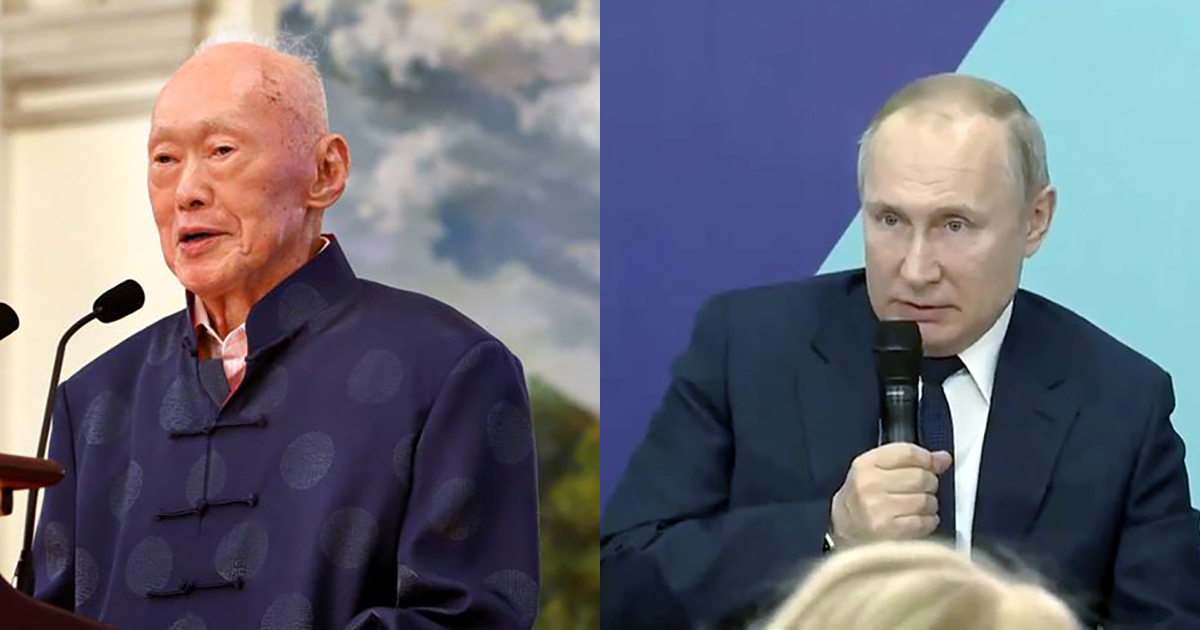Russia President Vladimir Putin has rejected the idea of instituting a position akin to that of Minister Mentor held by the late Lee Kuan Yew, on the grounds that it will be "disastrous" for Russia, Russian media TASS reported.
Путин об использовании сингапурского опыта и создания в России поста «наставника»: Вы хотите, чтобы наставником был я? Если появится какой-то институт над президентом, это будет означать ничто другое, как двоевластие. Абсолютно губительная ситуация для такой страны, как Россия pic.twitter.com/rcoVdprDZE
— Дмитрий Смирнов (@dimsmirnov175) January 22, 2020
News of Putin's comments were subsequently picked up by Reuters and international media.
Russia must be a "strong presidential republic"
Speaking on Jan. 21 at a meeting with university students, Putin elaborated that the creation of such a position would undermine Russia's presidency, as it will result in a government by two independent authorities.
Putin said: "Once any institution emerges above president, it will mean nothing else but diarchy. It is an absolutely disastrous situation for a country like Russia."
He also stressed that it was crucial for Russia to be a "strong presidential republic" given the country's numerous ethnic groups, Reuters reported.
Putin added: "Our country, obviously, has to be a strong presidential republic. That’s the first thing. And then, we have so many ethnic groups, nationalities, ways of life, it is practically impossible to integrate in the framework of a parliamentary republic."
Student suggested Minister Mentor position
Putin's statement had been given in response to a university student who had asked about his prospects after the expiry of his presidential term in 2024.
The student had also proposed Singapore's position of Minister Mentor as an example of a post-presidency position.
Putin said in response: "You want me to be the Minister Mentor?"
Putin also noted how the late Lee had been a mentor during the tenure of his son, Prime Minister Lee Hsien Loong.
Putin said: "He was father of the incumbent [prime minister], so the succession was direct."
Still praised Lee Kuan Yew
Putin still praised the late Lee, however, calling him an "outstanding man".
He said: "He was an outstanding man... That’s true, he was, I don’t know, around 30 years in power, and he founded the country, that’s true."
Putin recently proposed weakening the presidency
Putin's answers are significant given that previously on Jan. 14, he had proposed changes to Russia's constitution, which would see both the Russian parliament and prime minister strengthened at the expense of the presidency, The New York Times reported.
Such changes involve, for instance, the requirement of the president to accept the prime minister's cabinet appointments.
BBC reported that the Russian government then resigned hours after the proposals by Putin, with Russia's Prime Minister Dmitry Medvedev stating that it had done so to help facilitate the changes such a move entailed.
Medvedev called it "substantial changes not only to an entire range of articles of the constitution, but also to the entire balance of power, the power of the executive, the power of the legislature, the power of judiciary".
This has led to speculation that Putin is seeking ways to maintain his power beyond the expiry of his term in 2024, including becoming the prime minister once again with additional powers, CNN reported.
Putin had previously served as Russia's president from 2000 to 2008, then as prime minister from 2008 to 2012, before becoming president again.
Top image collage left photo from Lee Hsien Loong Facebook page, right screenshot from Russia Today
If you like what you read, follow us on Facebook, Instagram, Twitter and Telegram to get the latest updates.
